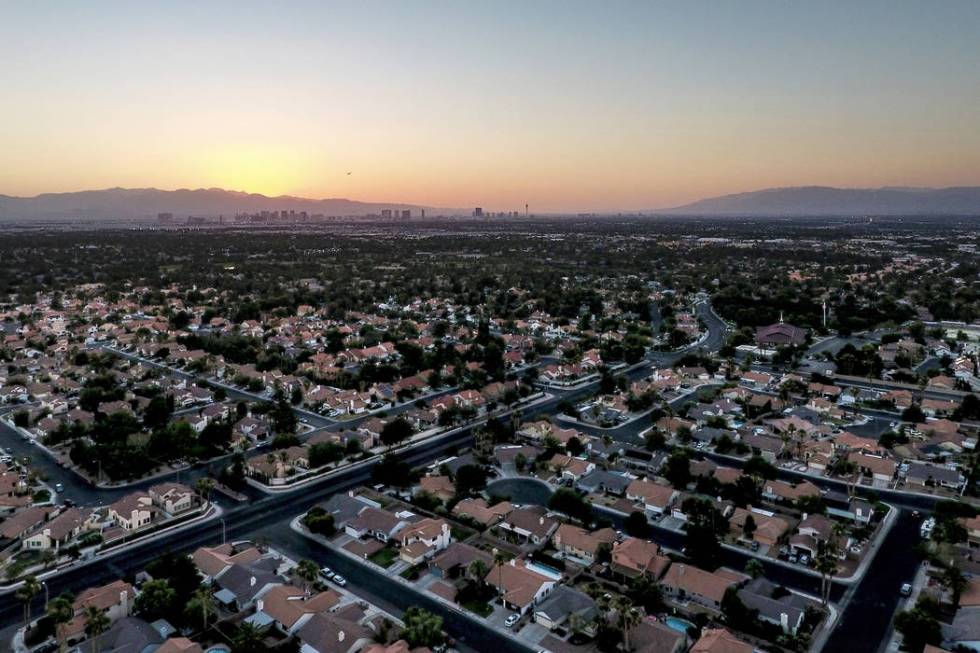Las Vegas’ heated housing market showing signs of cooling down

Fredrick Cager has seen homes get multiple bids and owners pass on his offers as he’s looked to buy a house in Las Vegas.
The 46-year-old pastor from Memphis, Tennessee, isn’t impressed with Las Vegas’ cookie-cutter housing stock, and as he described it, affordability isn’t a problem for him. However, “dollar signs are dancing in people’s eyes right now.”
Las Vegas’ housing market hit top speed last year. Sales prices and rental rates rose at some of the fastest clips in the country. Newly built apartment buildings filled with tenants, and developers sold the most homes in more than a decade.
But in a region where buyers, brokers and builders are wary of repeating the wild boom and devastating crash of the 2000s, Las Vegas’ nationally leading numbers aren’t sparking mass celebrations. And, amid concerns that buyers can’t keep up with the rising prices, there are already signs of a pullback, including tumbling sales and soaring availability.
“I think there is an affordability problem here in town,” RE/MAX Excellence agent Tim Kelly Kiernan said.
Homes priced below $325,000 sell quickly, he said, but more expensive houses seem “to just sit there” and can get passed over for newly built homes.
Las Vegas is not alone. In a number of cities, jobs are strong, property values are rising and home sales are sliding, National Association of Realtors chief economist Lawrence Yun said.
Cheryl Young, senior economist with listing site Trulia, said recently that the U.S. housing market “appears to be running on fumes.”
Prices are still climbing, but “signs of a slowdown are officially here,” she said.
‘Clearly unsustainable’
John Restrepo, founder of Las Vegas consulting firm RCG Economics, said it’s “tough to say” whether the local market became overheated last year. He noted that wages are growing slower than home prices.
Restrepo expects the market to keep cooling in 2019, but he said that does not mean it will “fall off the map.”
Brian Gordon, co-owner of local consulting firm Applied Analysis, said Las Vegas home prices have been rising at a “clearly unsustainable” rate and will likely grow slower, but given the region’s population growth and strengthened job market, “there will continue to be demand for housing.”
By almost any measure, that demand sped up last year.
November home prices in Southern Nevada rose 12 percent from a year earlier, more than double the national rate, according to the S&P CoreLogic Case-Shiller index. Las Vegas’ price growth was fastest among the 20 markets in the report for the sixth consecutive month.
Builders closed around 10,670 sales in Southern Nevada last year, the most since 2007, Home Builders Research figures show.
In January, the median sales price of a previously owned single-family home was $300,000, up 13 percent from a year earlier, while about 1,820 houses traded hands, down 19 percent. Sales totals have been posting year-over-year declines for months, and the once-depleted inventory of houses listed without offers has nearly doubled in the past year, to around 7,250 at January’s end, according to Greater Las Vegas Association of Realtors data.
GLVAR President Janet Carpenter, managing broker of Signature Real Estate Group’s Summerlin office, said that when the market was really hot in the past year or so, homes sold before agents held an open house.
“Now if you drive around on a Saturday or Sunday, there are open-house signs on every corner,” Carpenter said.
‘We’ll be fine’
Las Vegas’ apartment market has heated up in recent years with higher rents, low vacancies and increased construction. But it’s not immune from a cool-down.
Apartment dwellers paid an average of $1,059 in monthly rent last quarter, up 8.1 percent from a year earlier, the second-fastest growth rate in the country, according to Reis Inc. The valley’s packed buildings aren’t as crammed as they used to be, though.
Las Vegas’ apartment vacancy rate was 4 percent last quarter, up from 3.2 percent a year earlier, according to Reis.
Apartment developer Jonathan Fore said the valley’s rent growth last year was unsustainable, and he expects slower gains in 2019. And despite the surge in construction, Fore said supply is keeping pace with demand and developers aren’t overbuilding.
Fore, managing partner of Fore Property Co., noted that when he developed Lotus, a new luxury complex in the Chinatown area, he expected to sign 20 to 25 leases a month. Instead, tenants took 40 units per month.
Developers put up even more rental projects before the economy crashed, he said. As long as investors “don’t get crazy” and build at that pace, he said, “we’ll be fine.”
Contact Eli Segall at esegall@reviewjournal.com or 702-383-0342. Follow @eli_segall on Twitter.